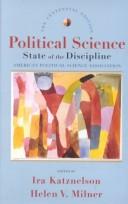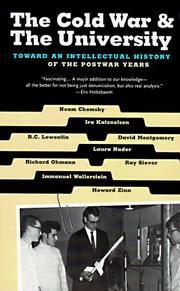| Listing 1 - 6 of 6 |
Sort by
|
Book
ISBN: 9780521728287 9780521899468 9780511790782 9780511424304 0511424302 9780511423314 0511423314 0511423829 9780511423826 0511790783 052189946X 0521728282 1107202396 1281775797 9786611775797 0511422652 0511421990 9781107202399 9781281775795 661177579X 9780511422652 9780511421990 Year: 2008 Publisher: Cambridge Cambridge University Press
Abstract | Keywords | Export | Availability | Bookmark
 Loading...
Loading...Choose an application
- Reference Manager
- EndNote
- RefWorks (Direct export to RefWorks)
The book examines the origins and development of the modern liberal tradition and explores the relationship between republicanism and liberalism between 1750 and 1830. The authors consider the diverse settings of Scotland, the American colonies, the new United States, and France and examine the writings of six leading thinkers of this period: Adam Smith, Adam Ferguson, James Madison, Thomas Paine, Germaine de Staël, and Benjamin Constant. The book traces the process by which these thinkers transformed and advanced the republican project, both from within and by introducing new elements from without. Without compromising civic principles or abandoning republican language, they came to see that unrevised, the republican tradition could not grapple successfully with the political problems of their time. By investing new meanings, arguments, and justifications into existing republican ideas and political forms, these innovators fashioned a doctrine for a modern republic, the core of which was surprisingly liberal.
Liberalism --- Republicanism --- Liberal egalitarianism --- Liberty --- Political science --- Social sciences --- History --- Political philosophy. Social philosophy --- Social Sciences --- Political Science
Book
ISBN: 0155707469 Year: 1979 Publisher: New York, N.Y. Harcourt Brace Jovanovich
Abstract | Keywords | Export | Availability | Bookmark
 Loading...
Loading...Choose an application
- Reference Manager
- EndNote
- RefWorks (Direct export to RefWorks)

ISBN: 0393978710 9780393978711 Year: 2002 Publisher: New York, N.Y. W.W. Norton & Company
Abstract | Keywords | Export | Availability | Bookmark
 Loading...
Loading...Choose an application
- Reference Manager
- EndNote
- RefWorks (Direct export to RefWorks)
Politics --- State, The --- Political science
Book
ISBN: 9780691155043 9780691155050 9780691189468 Year: 2022 Publisher: Princeton, N.J. Princeton University press
Abstract | Keywords | Export | Availability | Bookmark
 Loading...
Loading...Choose an application
- Reference Manager
- EndNote
- RefWorks (Direct export to RefWorks)
Digital
ISBN: 9780511779510 Year: 2010 Publisher: Cambridge Cambridge University Press
Abstract | Keywords | Export | Availability | Bookmark
 Loading...
Loading...Choose an application
- Reference Manager
- EndNote
- RefWorks (Direct export to RefWorks)

ISBN: 1565843975 Year: 1997 Publisher: New York, N.Y. New Press
Abstract | Keywords | Export | Availability | Bookmark
 Loading...
Loading...Choose an application
- Reference Manager
- EndNote
- RefWorks (Direct export to RefWorks)
Higher education --- anno 1980-1989 --- anno 1960-1969 --- anno 1950-1959 --- anno 1970-1979 --- United States --- Cold War --- Guerre froide --- Koude oorlog --- Oorlog [Koude ] --- Education [Higher ] --- Political aspects --- History --- 20th century --- Intellectual life --- United States of America
| Listing 1 - 6 of 6 |
Sort by
|

 Search
Search Feedback
Feedback About UniCat
About UniCat  Help
Help News
News